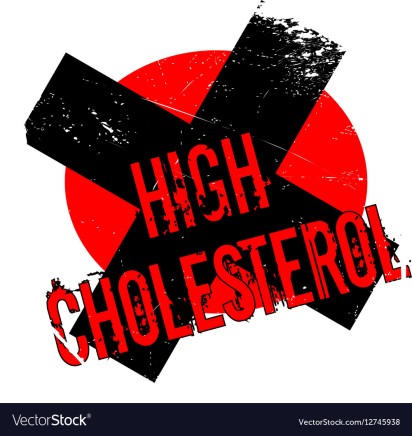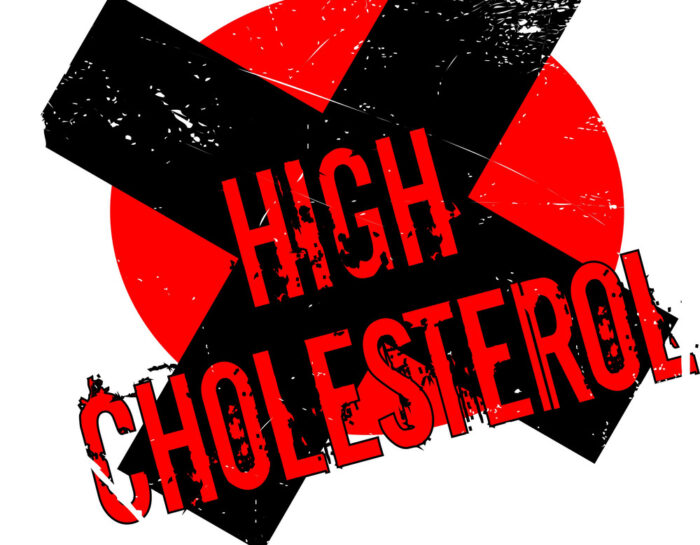by Chef K.T. Murphy
High cholesterol can have serious consequences, perhaps the most notable consequence is the risk of heart disease. In fact, it was a study that began in 1948 that first made the connection between the increased risk of heart disease and high levels of cholesterol.

High Cholesterol’s Effects On The Body
We need cholesterol in our bodies to function, but they should be at a healthy level. It’s a waxy, fatty substance that the liver makes, and distributes throughout the body. Cholesterol helps our bodies to make hormones, vitamin D, as well as making up bile acids. Less than 25% of our cholesterol levels come from our diet, and it’s found in animal fats.
Having a high cholesterol level means that there is more cholesterol in your blood than your body requires. The majority of people with high cholesterol doesn’t experience any obvious symptoms. You can find out about your cholesterol levels with a simple blood test.
If you’re found to have high cholesterol levels, then you can reduce your risks by changing your diet, exercising regularly, and using medication. According to WebMD, 1 in 6 Americans have cholesterol levels bordering on high.
The Digestive System
High cholesterol may also result in an imbalance of bile, which may result in gallstones. The National Institute of Diabetes and Digestive and Kidney Diseases suggests that over 80% of gallstones are the result of cholesterol stones.
Plaque building up in the arteries blocks the flow of blood to your stomach and kidneys. This can result in intestinal ischemic syndrome, this is where a blockage is located in the arteries that lead to the bowel or intestines. Symptoms of this include bloody stool, abdominal pain, vomiting, and nausea.
The Circulatory System
Lipoproteins assist cholesterol as it moves through the bloodstream. There are two types and both are necessary. There are the Low Density Lipoproteins (LDL), and the High Density Lipoproteins (HDL).
The LDL works to transport cholesterol to where it’s required, and it cholesterol levels are too high, it will be deposited in the arteries. LDL is considered the bad cholesterol. While, HDL is known as good cholesterol, as takes the extra cholesterol away from your cells and tissues, and takes it back to the liver to be re-purposed.
As the arteries narrow it becomes more difficult for the heart to pump blood. If a plaque area burst, it may result in a blood clot, blocking the flood of blood altogether.
This increases, according to the National Heart, Lung, and Blood Institute, your risk of heart attack, as well as the following symptoms:
- Angina
- Increased risk of heart disease
- Increased risk of stroke
- Increased risk of diabetes
- Discomfort in the chest
- Pressure in the chest
- Jaw pain
- Back pain
- Shoulder pain
- Neck pain
- Arm pain
Angina is often mistaken for heartburn of indigestion. If the flow of blood to one section of the heart is blocked, then the result is heart attack. A heart attack means that the heart muscle is dying. At this stage, it is vital for the blood flow to be restored quickly, failure to act quickly risks permanent damage to the heart, or death.
Plaque can build up in arteries that transport blood to the brain, this results in your brain being oxygen deprived. Plaque is a hardened mixture of fat, and cholesterol. This causes brain cells to become damaged quickly, and they begin to die which results in a stroke.
The symptoms of a stroke include numbness or weakness, difficult in moving limbs, trouble with speaking, seeing. You will often see one side of the face begin to droop. A stroke can result in disability, brain damage, or death.
The buildup of plaque can also interfere with the blood flowing to your limbs, which is a sign of peripheral arterial disease. You may feel pain or numbness, and this increases a risk of infection in the affected limbs, which can result in gangrene, thus amputation.
All the best, Good Food makes For Better Decisions.
Chef Murph
Tags: Chef K.T. Murphy, chef keith murphy, chef murph, Chef Murph TV, Chef Murphy, Chinese, food, Foodist Networks, Global Fusion Americana, High Cholesterol, Recipes


